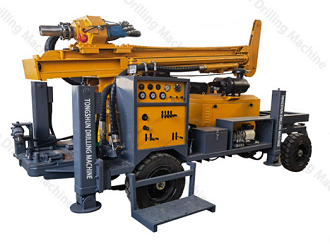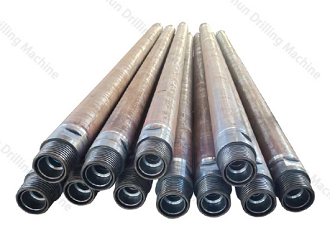In the world of drilling, choosing the right tool can make all the difference in efficiency and effectiveness. Whether you're working on a home project or a large-scale industrial operation, understanding the distinctions between drill bits and down-the-hole (DTH) hammers is crucial. In this article, we'll explore the differences, advantages, and applications of these two drilling tools, helping you make an informed decision for your next project.
Drill bits are cutting tools used to create cylindrical holes in various materials. They are designed to remove material as they rotate, allowing for precise and clean cuts. Drill bits come in various shapes and sizes, each suited for different tasks.
Twist Drill Bits: The most common type, twist drill bits are versatile and can be used on materials like wood, metal, and plastic.
Spade Bits: These flat bits are ideal for drilling large holes in wood.
Masonry Bits: Designed for drilling into hard materials like concrete and stone.
Other Specialty Bits: Includes bits designed for glass, tile, and other specific materials.
Versatility: Suitable for a wide range of materials.
Cost-effectiveness: Generally cheaper than DTH hammers.
Ease of use: Simple to operate and maintain.
Wear and tear: Bits can dull quickly, especially on hard materials.
Limited to certain materials: Not ideal for very hard materials like granite.
Depth limitations: Not suitable for very deep drilling.
Down-the-hole hammers are a type of drilling tool that uses a pneumatic hammer to drive a drill bit into the ground. The hammer is located directly behind the drill bit, providing high-impact energy to break through hard rock and other tough materials.
Piston: Provides the hammering action.
Bit: The cutting tool that drills into the material.
Air Inlet: Supplies compressed air to power the hammer.
Button Bits: Feature small, round protrusions that crush rock as the bit rotates.
Cross Bits: Have a cross-shaped design for more efficient cutting.
High efficiency in hard rock: Ideal for tough drilling conditions.
Greater depth capabilities: Can drill deeper holes than traditional drill bits.
Precision drilling: Offers more control and accuracy.
Higher initial cost: More expensive than drill bits.
Maintenance requirements: Require regular maintenance to function optimally.
Not ideal for all materials: Best suited for hard rock and similar materials.
General construction: For drilling holes in wood, metal, and plastic.
Carpentry and woodworking: Essential for crafting furniture and other wooden items.
Home repairs: Handy for DIY projects around the house.
Mining and quarrying: For extracting minerals and other resources.
Oil and gas exploration: To drill wells for oil and natural gas.
Geotechnical drilling: Used in site investigations and foundation construction.
Selecting the right drilling tool depends on various factors, including the material you're working with, the required depth, and your budget. Here's a quick guide:
Use drill bits for: Shallow holes in softer materials like wood, metal, and plastic.
Use DTH hammers for: Deep holes in hard rock and similar materials.
When considering costs, it's important to look at both initial expenses and long-term considerations:
Drill Bits: Generally cheaper upfront but may require frequent replacement.
DTH Hammers: Higher initial cost but more durable, especially for heavy-duty applications.
Choosing between drill bits and down-the-hole hammers depends on the specific requirements of your project. While drill bits offer versatility and cost-effectiveness for general use, DTH hammers are the go-to choice for challenging drilling conditions. By understanding the strengths and limitations of each tool, you can make the best choice for your needs. For further assistance or to find a reliable supplier, feel free to contact us.


Copyright © Jinzhou City TongShun Drilling Machine Co.,Ltd. All Rights Reserved Sitemap | Powered by 